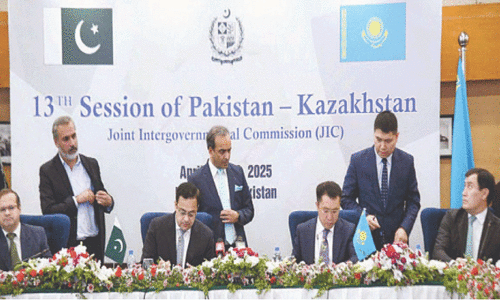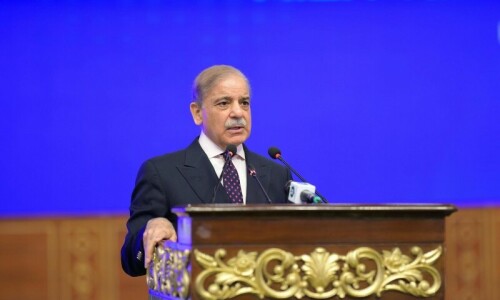KARACHI: Amid uncertain external pressures and expectations of subdued demand, the State Bank of Pakistan (SBP) on Monday left its policy rate unchanged at an all-time high of 21 per cent for the next two months.
The Monetary Policy Committee (MPC) of the central bank on Monday decided to keep the key lending rate steady as it noted a sequential ease in inflation expectations of both consumers and businesses from their recent peaks.
The financial market was also expecting the status quo but their views were somehow different. Along with the business community, researchers and analysts were sure that a further hike in the interest rate would destroy the domestic economy as almost all sectors showed negative performance. Demand for credits went down to the lowest level as a 21pc-plus interest rate is not feasible for any business.
“The private sector credit (PSC) saw net retirement for the fourth consecutive month in April, mainly because of a substantial reduction in demand for working capital and consumer loans in the wake of subdued economic activity and high borrowing costs,” the MPC said in its statement.
Financial market experts were of the firm belief that taming the unprecedented 38pc inflation by raising interest rates could simply further deteriorate economic growth.
The SBP still sees 0.3pc growth for FY23 but independent economists predict a contraction in the range of 2 to 3pc of GDP.
“The provisional National Accounts Committee’s (NAC) estimates show that the real GDP would grow by a meagre 0.3pc in FY23 against 6.1pc economic expansion in FY22.
The major drag came from a significant contraction in value addition of industry due to several adverse domestic and external factors, while the services sector grew at the slowest pace since the Covid-impacted FY20,” observed the MPC.
“Inflation remained broad-based, with food continuing to contribute more than half to the overall inflation in May. Importantly, core inflation maintained its upward trajectory,” noted the SBP’s committee.
The MPC said that maintaining the current policy stance is necessary to bring inflation down to the medium-term target range of 5-7pc by the end of FY25.
“The usual end-year increase in developmental spending and downturn in revenue collection amidst a substantial slowdown in domestic economic activity and contraction in imports, points to a further increase in the fiscal deficit in the last quarter (Q4) of FY23,” explained the monetary policy statement.
“The revised estimates show fiscal deficit at 7pc and primary deficit at 0.5pc of GDP for FY23,” it added.
The committee noted multiple important developments since the last meeting held on April 4. The provisional NAC estimates show real GDP growth to have decelerated considerably during FY23. Also, the current account balance recorded back-to-back surpluses in March and April, which reduced some pressures on foreign exchange reserves. Furthermore, the government unveiled the budget for FY24 on June 9, which envisages a slightly contractionary fiscal stance against the revised estimates for FY23. The global commodity prices and financial conditions have eased recently and are expected to persist in the near term.
Despite continued pressure on the external front of the economy, the MPC said the narrowing of the current account deficit (CAD) has somewhat contained pressures on the foreign exchange reserves and the interbank exchange rate, which has broadly remained stable since the last MPC meeting. The deficit during July-April dropped to $3.3bn, less than one-fourth of last year’s deficit.
Published in Dawn, June 13th, 2023














































